
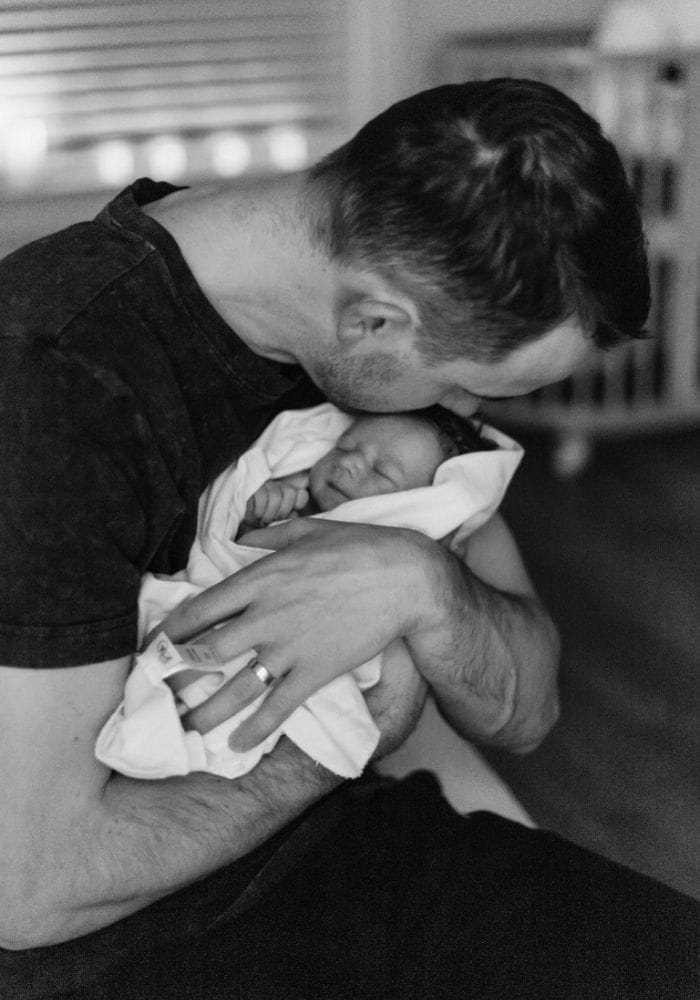
Becoming a new dad is one of the biggest, most transformative experiences of life.
While nothing fully prepares you for the process, there are ways to ground yourself, stay connected, and show up in a way that’s meaningful and supportive for your family.
Over the years, I’ve walked alongside hundreds of couples during pregnancy, labor, and postpartum, and one thing I always try to emphasize — especially for new dads — is this: Your presence matters. Whether you’re feeling ready or nervous, overwhelmed or excited, you are an essential part of this journey.
This post is for you, new dad, and for anyone wondering how to prepare for a baby in a way that’s supportive, involved, and empowering.
Why It’s Important to Prepare for Birth as a New Dad
With mom’s body doing so much crucial work, new dads often have questions about how they can contribute during pregnancy and birth.
When you prepare and develop certain basic skills, you become your wife’s main support, advocate, and comfort during labor and delivery. As a certified nurse-midwife, I’ve seen that connecting with and supporting mom well results in better pregnancy outcomes for everyone.
I’ve also seen unprepared dads feel scared, frozen, or helpless during births. They desperately want to offer support, but they’re at a loss. By taking time to learn and prepare, you put yourself in the best position to come through for your family when they need you most.
You don’t have to take my word for it. Throughout this post, you’ll find advice and experiences from husbands of Haven team members who’ve been through it all before. Here’s a pearl of wisdom from my own husband:
“Reflect early and often in pregnancy about the reality that bringing life into your family is the most significant experience of your lives. It’s just common sense to be intentional with your wife and family in the preparation…Carve out times for conversations, take notes, and then genuinely find out and understand the why to the heart’s desires so you can be her advocate.” — Dustin Denning, father of 3 and my husband
New Dad Prep: What You Can Do Ahead of Time
“The best thing that prepared me for the birth experience was going in and sitting down with the midwives and letting them talk through the process. They answered all my questions and just reassured me of how everything works.” — Jacob Coffey, father of 4, husband of Haven nurse and birth assistant Rebecca Coffey
Birth Preparation for New Dads
Take a birth class with your wife. Even as a midwife, I took a birth class with my husband! There’s wisdom in walking through your preparation together, even if one of you already has a good idea of what to expect. You get on the same page regarding understanding, wants, and expectations.
Birth classes bring up conversations you might not have thought of otherwise. You’ll learn how she feels supported, what she’s hoping for, and what she’s excited or nervous about. This helps you anticipate her needs and respond to the demands of the process better when the big day arrives.
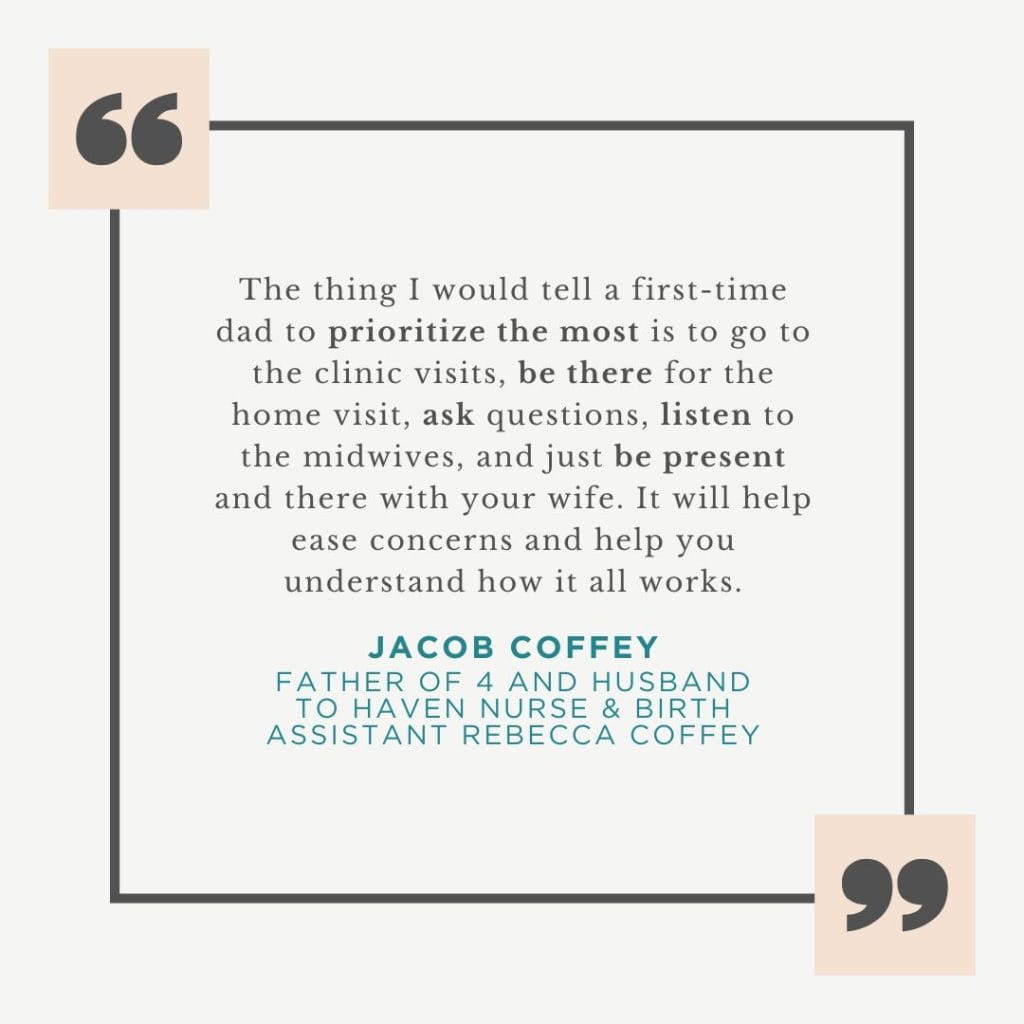
“The thing I would tell a first-time dad to prioritize the most is to go to the clinic visits, be there for the home visit, ask questions, listen to the midwives, and just be present and there with your wife. It will help ease concerns and help you understand how it all works.” — Jacob Coffey
Read birth stories together. Try reading one account a night from birth stories that resemble your plan. For example, if you’re preparing for a home birth, Ina May Gaskin’s Guide to Childbirth has excellent stories that help you learn what to expect. My husband and I did this with our first baby, reading birth stories aloud and talking through them to give us both a clear picture of what to anticipate.
Practice different physical support positions. Learn techniques like the three sisters of balance, side-lying release, and counter pressure. If you’re using hypnobirthing or similar tools, practice those together as well.
“Another must is having providers and a birth team you trust and feel comfortable and open with. Based on my experience, I would encourage husbands for their wives to have a doula. Having an experienced doula brings me much more confidence to be even more intentional for my wife during labor. Ask questions to the providers. You’re a guy, you’re not supposed to know all the things, so ask all the dumb questions. It really is helpful.” — Dustin Denning
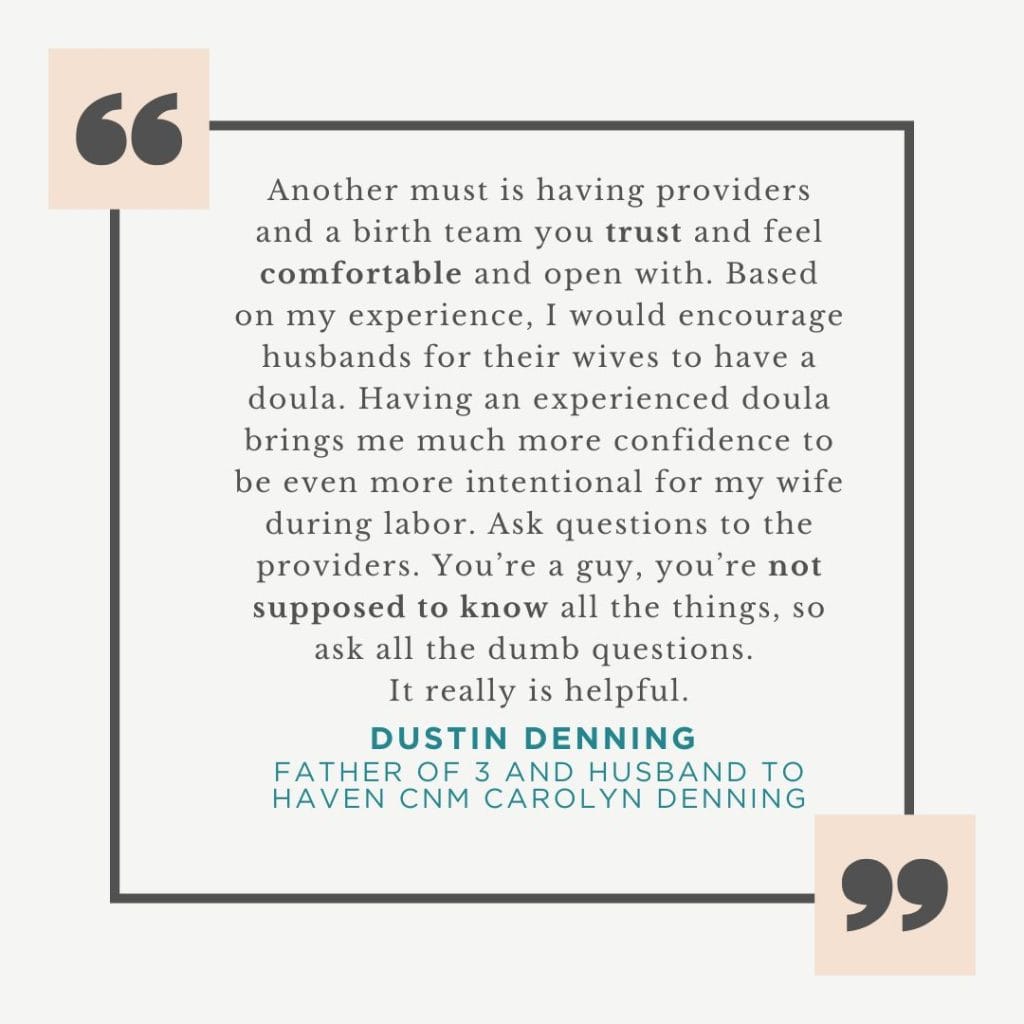
Take care of your own needs. Anticipate your own needs depending on your birth plan so it’s not another thing for your wife to think about. For instance, if you’re birthing outside your home, pack your own hospital bag. Have snacks and food available. Be sure to nourish and hydrate yourself so you can be present and provide support from a good place.
Know the birth plan. Make sure you know the plan inside and out. You know your wife better than anyone else in the room will, even the birth team. You know what comforts her, what annoys her, and what she wants. Well before the due date, get clear answers to questions like:
- Where will the birth take place?
- Who are you calling and when? (Save these numbers in your phone.)
- What supplies will you need (and where are they)?
- If leaving your home, which route are you taking? Which car?
- Is childcare sorted?
Making these decisions and arrangements ahead of time reduces stress and leaves you free to stay in the moment when you’re needed.
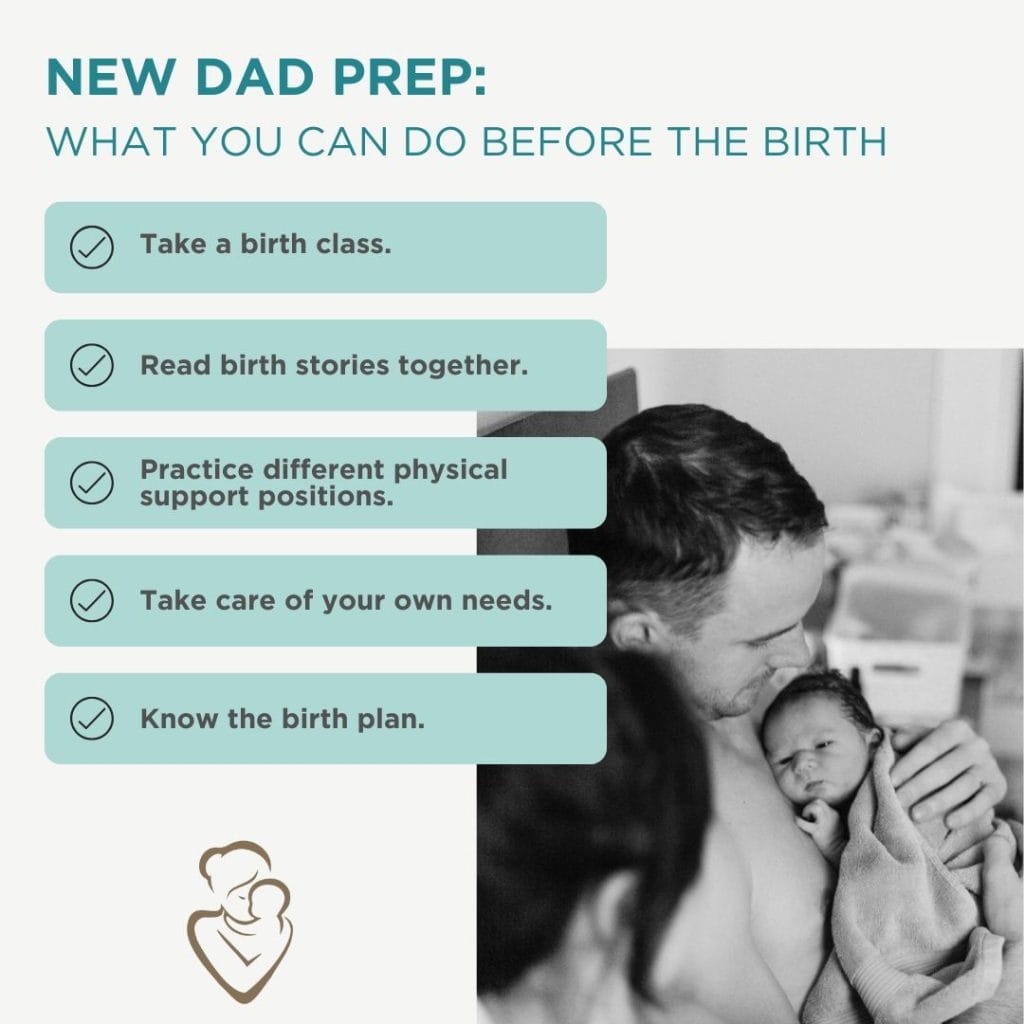
“Some practical advice for home birth dads is to overly prep for the day. Work with your wife. Make it fun in setting up the space. Know where all the supplies are. And be the master of the birthing tub. Do a trial run filling up the tub to make sure you have enough hot water and have a system in place to keep the water at the right temp if your hot water heater can’t keep up.” — Dustin Denning
Postpartum Preparation for New Dads
“Be prepared for some sleep deprivation. Give everybody lots of grace.” — Brennen Finchum, father of 4, husband of Haven operations manager Betsy Finchum
The immediate postpartum period is another time when new dads really shine. Take the time to plan with your wife what this time will look like:
- What do you both need to be set up for success? Keep in mind she should be resting often, staying hydrated, and eating nourishing food.
- What does mom want her postpartum experience to look like? Get a clear understanding of her goals.
- What are all of mom’s current responsibilities? Make a list and either delegate them to family or friends (including you), hire them out, or let them go.
“Postpartum for dads can be highly stressful, so it’s up to the dad to stay in the moment, to provide peace, to make the long nights enjoyable. Choose joy. Laugh, laugh, laugh a lot, laugh at the crazy, and be ready to sacrifice your time to support your wife with any of the needs that present on a daily basis. It’s all worth it.” — Dustin Denning
Some moms struggle with postpartum depression (PPD) or anxiety (PPA) after childbirth. This is another area where you’re in the best position to support your wife. You know her best and spend the most intimate time with her, so you’re more likely than anyone else to notice if something seems off.
Your birthing classes will teach you what a normal postpartum experience looks like — such as quick emotional ups and downs — and how to recognize what falls outside that range — such as staying down for a long period.
If you notice potential signs of PPD or PPA, you can seek help from your wife’s provider, either by encouraging her to call or by calling yourself.
What New Dads Can Expect During Labor and Delivery
Every woman is different, and we won’t know what labor will look like until she’s in it. The range of normal is WIDE.
Your wife could be internal and quiet, wanting no touching, or she might be very vocal, wanting physical support and verbal coaching through every contraction. It’s helpful to learn skills for both scenarios and to be ready for anything, which is one reason learning how to prepare for a baby through classes and conversations is so important.
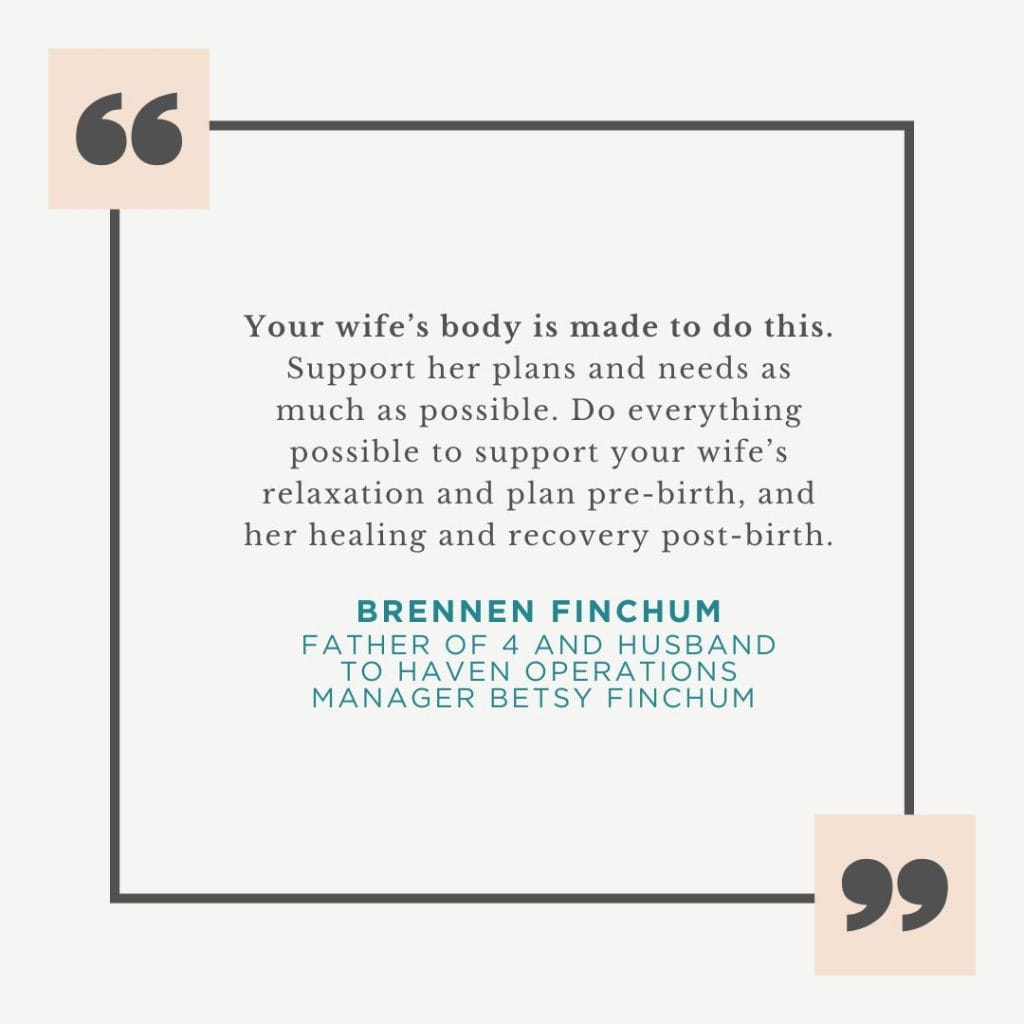
“Your wife’s body is made to do this. Trust her and give her grace. Communicate when you have a real opinion, and support her plans and needs as much as possible. Do everything possible to support your wife’s relaxation and plan pre-birth, and her healing and recovery post-birth.” — Brennen Finchum
If you feel lost about how best to provide support, lean on your birth team and your instinctual, intimate knowledge of your wife.
What You Might See, Hear, and Experience
For dads who don’t routinely witness births, this incredible experience — while incredible — can be intense and even overwhelming. As midwives, we know all the sights and sounds are natural and encouraging because they mean progress is happening.
Here’s a brief overview of what you might see and hear during labor and birth.
You might see:
- Your baby emerging and being born
- Poop, vomit, blood, and amniotic fluid
It’s important to talk together ahead of time about what you both want regarding where you’ll be positioned and what you’ll see during birth.
You might hear:
- Loud vocalizing OR silence
- Deep breathing
- Your birth team offering encouragement, coaching, or explanations
The stages of labor, which you’ll learn about during your birth classes, all sound different. The most intense tends to be the stage of transition, right before baby is born. Moms may get discouraged, loud, and/or scared during this time, which is when she needs you most.
This is perfectly normal; midwives even get excited at this time because we know a miracle is right around the corner.
If you’re confused, at a loss, or need guidance at any stage, don’t be afraid to lean on your midwife and birth team. They’re experts in physiologic birth, and it’s never wrong to ask questions!
New Dad, New Baby, One Beautiful Journey
Learning how to prepare for a baby is one of the most important things you can do as a new dad. Your preparation will help you be the rock your wife needs during labor, delivery, and postpartum.
Your Haven birth team is here to support both of you through this incredible journey, from preparatory conversations to post-birth cleanup.
“What surprised me the most about the home birth was the following morning. A few hours later, we woke up and everything was cleaned up. Everybody was gone, and Rebecca and I were lying in the bed with our newborn baby and it was like nothing had happened. We went from no baby to baby, just like that. And everything was peaceful and wonderful, and there we were in our own home.” — Jacob Coffey
The more prepared you are as a new dad, the more you’ll be able to stay present and enjoy this transformative time in your lives. And we’re here to support you and cheer for you every step of the way.
Becoming a new dad is one of the biggest, most transformative experiences of life.
While nothing fully prepares you for the process, there are ways to ground yourself, stay connected, and show up in a way that’s meaningful and supportive for your wife.
Over the years, I’ve walked alongside hundreds of couples during pregnancy, labor, and postpartum, and one thing I always try to emphasize — especially for new dads — is this: Your presence matters. Whether you’re feeling ready or nervous, overwhelmed or excited, you are an essential part of this journey.
This post is for you, new dad, and for anyone wondering how to prepare for a baby in a way that’s supportive, involved, and empowering.
Why It’s Important to Prepare for Birth as a New Dad
With mom’s body doing so much crucial work, new dads often have questions about how they can contribute during pregnancy and birth.
When you prepare and develop certain basic skills, you become your wife’s main support, advocate, and comfort during labor and delivery. As a certified nurse-midwife, I’ve seen that connecting with and supporting mom well results in better pregnancy outcomes for everyone.
I’ve also seen unprepared dads feel scared, frozen, or helpless during births. They desperately want to offer support, but they’re at a loss. By taking time to learn and prepare, you put yourself in the best position to come through for your family when they need you most.
You don’t have to take my word for it. Throughout this post, you’ll find advice and experiences from spouses of Haven team members who’ve been through it all before. Here’s a pearl of wisdom from my own husband:
“Reflect early and often in pregnancy about the reality that bringing life into your family is the most significant experience of your lives. It’s just common sense to be intentional with your wife and family in the preparation…Carve out times for conversations, take notes, and then genuinely find out and understand the why to the heart’s desires so you can be her advocate.” — Dustin Denning, father of 3 and my husband
New Dad Prep: What You Can Do Ahead of Time
“The best thing that prepared me for the birth experience was going in and sitting down with the midwives and letting them talk through the process. They answered all my questions and just reassured me of how everything works.” — Jacob Coffey, father of 4, husband of Haven nurse and birth assistant Rebecca Coffey
Birth Preparation for New Dads
Take a birth class with your wife. Even as a midwife, I took a birth class with my husband! There’s wisdom in walking through your preparation together, even if one of you already has a good idea of what to expect. You get on the same page regarding understanding, wants, and expectations.
Birth classes bring up conversations you might not have thought of otherwise. You’ll learn how she feels supported, what she’s hoping for, and what she’s excited or nervous about. This helps you anticipate her needs and respond to the demands of the process better when the big day arrives.
“The thing I would tell a first-time dad to prioritize the most is to go to the clinic visits, be there for the home visit, ask questions, listen to the midwives, and just be present and there with your wife. It will help ease concerns and help you understand how it all works.” — Jacob Coffey
Read birth stories together. Try reading one account a night from birth stories that resemble your plan. For example, if you’re preparing for a home birth, Ina May Gaskin’s Guide to Childbirth has excellent stories that help you learn what to expect. My husband and I did this with our first baby, reading birth stories aloud and talking through them to give us both a clear picture of what to anticipate.
Practice different physical support positions. Learn techniques like the three sisters of balance, side-lying release, and counter pressure. If you’re using hypnobirthing or similar tools, practice those together as well.
“Another must is having providers and a birth team you trust and feel comfortable and open with. Based on my experience, I would encourage husbands for their wives to have a doula. Having an experienced doula brings me much more confidence to be even more intentional for my wife during labor. Ask questions to the providers. You’re a guy, you’re not supposed to know all the things, so ask all the dumb questions. It really is helpful.” — Dustin Denning
Take care of your own needs. Anticipate your own needs depending on your birth plan so it’s not another thing for your wife to think about. For instance, if you’re birthing outside your home, pack your own hospital bag. Have snacks and food available. Be sure to nourish and hydrate yourself so you can be present and provide support from a good place.
Know the birth plan. Make sure you know the plan inside and out. You know your wife better than anyone else in the room will, even the birth team. You know what comforts her, what annoys her, and what she wants. Well before the due date, get clear answers to questions like:
- Where will the birth take place?
- Who are you calling and when? (Save these numbers in your phone.)
- What supplies will you need (and where are they)?
- If leaving your home, which route are you taking? Which car?
- Is childcare sorted?
Making these decisions and arrangements ahead of time reduces stress and leaves you free to stay in the moment when you’re needed.
“Some practical advice for home birth dads is to overly prep for the day. Work with your wife. Make it fun in setting up the space. Know where all the supplies are. And be the master of the birthing tub. Do a trial run filling up the tub to make sure you have enough hot water and have a system in place to keep the water at the right temp if your hot water heater can’t keep up.” — Dustin Denning
Postpartum Preparation for New Dads
“Be prepared for some sleep deprivation. Give everybody lots of grace.” — Brennen Finchum, father of 4, husband of Haven operations manager Betsy Finchum
The immediate postpartum period is another time when new dads really shine. Take the time to plan with your wife what this time will look like:
- What do you both need to be set up for success? Keep in mind she should be resting often, staying hydrated, and eating nourishing food.
- What does mom want her postpartum experience to look like? Get a clear understanding of her goals.
- What are all of mom’s current responsibilities? Make a list together and either delegate them to family or friends (including you), hire them out, or let them go.
“Postpartum for dads can be highly stressful, so it’s up to the dad to stay in the moment, to provide peace, to make the long nights enjoyable. Choose joy. Laugh, laugh, laugh a lot, laugh at the crazy, and be ready to sacrifice your time to support your wife with any of the needs that present on a daily basis. It’s all worth it.” — Dustin Denning
Some moms struggle with postpartum depression (PPD) or anxiety (PPA) after childbirth. This is another area where you’re in the best position to support your wife. You know her best and spend the most intimate time with her, so you’re more likely than anyone else to notice if something seems off.
Your birthing classes will teach you what a normal postpartum experience looks like — such as quick emotional ups and downs — and how to recognize what falls outside that range — such as staying down for a long period.
If you notice potential signs of PPD or PPA, you can seek help from your wife’s provider, either by encouraging her to call or by calling yourself.
What New Dads Can Expect During Labor and Delivery
Every woman is different, and we won’t know what labor will look like until she’s in it. The range of normal is WIDE.
Your wife could be internal and quiet, wanting no touching, or she might be very vocal, wanting physical support and verbal coaching through every contraction. It’s helpful to learn skills for both scenarios and to be ready for anything, which is one reason learning how to prepare for a baby through classes and conversations is so important.
“Your wife’s body is made to do this. Trust her and give her grace. Communicate when you have a real opinion, and support her plans and needs as much as possible. Do everything possible to support your wife’s relaxation and plan pre-birth, and her healing and recovery post-birth.” — Brennen Finchum
If you feel lost about how best to provide support, lean on your birth team and your instinctual, intimate knowledge of your wife.
What You Might See, Hear, and Experience
For dads who don’t routinely witness births, this incredible experience — while incredible — can be intense and even overwhelming. As midwives, we know all the sights and sounds are natural and encouraging because they mean progress is happening.
Here’s a brief overview of what you might see and hear during labor and birth.
You might see:
- Your baby emerging and being born
- Poop, vomit, blood, and amniotic fluid
It’s important to talk together ahead of time about what you both want regarding where you’ll be positioned and what you’ll see during birth.
You might hear:
- Loud vocalizing OR silence
- Deep breathing
- Your birth team offering encouragement, coaching, or explanations
The stages of labor, which you’ll learn about during your birth classes, all sound different. The most intense tends to be the stage of transition, right before baby is born. Moms may get discouraged, loud, and/or scared during this time, which is when she needs you most.
This is perfectly normal, and midwives even get excited at this time because we know a miracle is right around the corner!
New Dad, New Baby, One Beautiful Journey
Learning how to prepare for a baby is one of the most important things you can do as a new dad. Your preparation will help you be the rock your wife needs during labor, delivery, and postpartum.
Your Haven birth team is here to support both of you through this incredible journey, from preparatory conversations to post-birth cleanup.
“What surprised me the most about the home birth was the following morning. A few hours later, we woke up and everything was cleaned up. Everybody was gone, and Rebecca and I were lying in the bed with our newborn baby and it was like nothing had happened. We went from no baby to baby, just like that. And everything was peaceful and wonderful, and there we were in our own home.” — Jacob Coffey
The more prepared you are as a new dad, the more you’ll be able to stay present and enjoy this transformative time in your lives. And we’re here to support you and cheer for you every step of the way.

Carolyn Denning, a midwife at Haven Birth and Wellness, grew up in the suburbs of Detroit and earned a degree in Human Physiology from Michigan State University. Her passion for supporting women through pregnancy led her to midwifery, starting as a doula while completing her nursing degree. She gained valuable experience as a Pediatric Emergency and Labor and Delivery nurse at Vanderbilt.Carolyn and her husband, Dustin, served as missionaries in South Africa, where she supported pregnant women and experienced her own transformative home birth. She is a proud mother of two girls, Levy and Josie, and enjoys traveling, exploring nature, and learning about different cultures.
